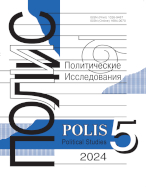Political Events as Seen by Russians:
Psycological Mechanisms of Perception and of Individual Interpretation
Pushkaryova G.V.,
Dr. Sci. (Polit. Sci.), Professor, Political Analysis Department, Faculty of Public Administration, Lomonosov Moscow State University, pushkarjeva@spa.msu.ru
elibrary_id: 76897 | ORCID: 0000-0003-1567-5652 | RESEARCHER_ID: AAB-2181-2022
DOI: 10.17976/jpps/2004.04.07
Pushkaryova G.V. Political Events as Seen by Russians: Psycological Mechanisms of Perception and of Individual Interpretation . – Polis. Political Studies. 2004. No. 4. https://doi.org/10.17976/jpps/2004.04.07
The task the author sets herself in this article is to analyze the processes of perception and interpretation of political events by an individual who is not their immediate participant. Using data of sociological polls, the author finds out that phenomena of political life rather seldom attract respondents’ attention. As exceptions, only such cases figure, that either have the touch of a sensation, or affect the individual’s everyday life, approach problems exciting him or her. At that, moreover, the individual perceives and assimilates with greater preparedness such information that is apt to be easily inscribed in the significance-bearing framework of his or her subjective perceptions of the world of politics. Under certain conditions, however, the individual can turn out able to reconsider his or her earlier formed perceptions, ideas or convictions. Yet, “revision” of one’s own established orientations requires serious psychological endeavour and actually happens only in case the new information is looked upon as affecting the individual’s vital interests or endangering his or her values. In the said case, a political event, as the dynamic aspect of politics, may actualize the individual’s political orientations, rouse him or her to taking certain actions.
See also:
Peregudov S.P.,
Transnational Corporations on the Way to Corporate Citizenship. – Polis. Political Studies. 2004. No3
Fyodorov K.G.,
The Policy in the Sphere of Local Taxation in Russia. – Polis. Political Studies. 2003. No4
Bube M.,
The Role of Parties in the Formation of Political System of Post-War Germany. – Polis. Political Studies. 2004. No6
Peregudov S.P.,
Corporate Capital and Power Institutions: Who Plays the Master?. – Polis. Political Studies. 2002. No5
Kazantzev A.A.,
Intelligentsia and Structural Innovations in Political Expanse (An Essay of Comparative Analysis). – Polis. Political Studies. 2007. No1





.jpg)






 print
print
.jpg)
.jpg)